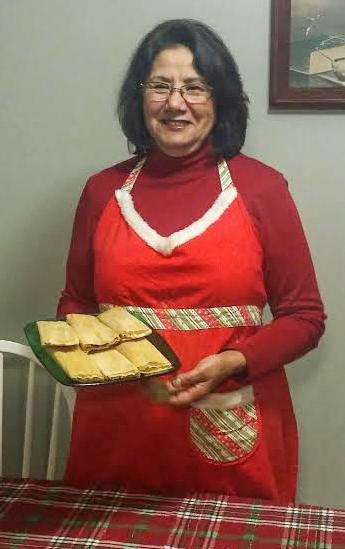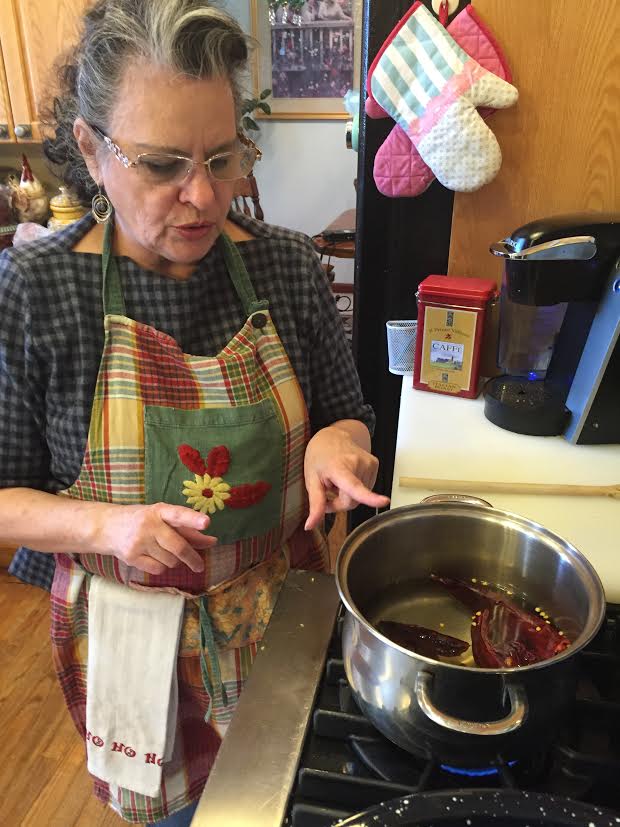
Updated: 12/24/2021
For my mother, spreading masa over corn husks at lightning speed, while singing along to Mexican ballads on the radio, is as familiar as breathing.
It’s what Ida Vela does year after year during the holidays, when making -- and eating -- tamales is a tradition among Mexican and Mexican-American families. Now 67 and the youngest of nine children, she becomes a tamale-making machine, churning out dozens and dozens of them for our family.
Nowadays, though, my mom and elders like her worry this tradition -- so deeply rooted in familial, communal, even spiritual significance -- is being lost among younger generations.
That includes me. I could tell you I don’t have the time or the kitchen space, which is true. But the real truth is tamales are a lot -- I mean a lot -- of work.
Ida's kids "love the tamales and everything, but they just don’t want to do ‘em,” she says. “They say it’s too hard, but if somebody doesn’t do it now they’re never going to learn and the tradition is going to go.”
That sentiment is something Becky Vasquez of Westminster can relate to. Vasquez was born in Arizona, but was raised in Sonora, Mexico. Like my mother, she was one of nine siblings. For Vasquez, 65, and her children, tamales are a joyous tradition.
“I wouldn’t tell them that I was going to make tamales and as soon as they walked in they would say, ‘Oh, it smells like Christmas in here!”
An Ancient Dish
Tamales have evolved since their Mesoamerican origination as early as 800 BC. Aztecs and Mayans made tamales with exotic ingredients that included flamingos and iguanas.
You won't find flamingos in today's varieties. But ingredients still vary, depending on one’s region.

“Tamales are different, whether they’re from New Mexico or Colorado, south Texas, even states and regions in Mexico, and it really depended on what was able to be grown there,” says Jose Quintana, a senior lecturer of Chicano Studies at the Metropolitan State University of Denver.
Quintana, who teaches a course called "Tacos, Tamales and Tortillas,' a social history of Mexican food in the United States," says Mexican tamales differ from those made in Central America, where it is common to eat tamales wrapped in banana leaves. In southwestern states including Colorado, corn husk-wrapped tamales are commonly filled with pork and red chile or cheese and green chile.
A Place To Share
Back in the day, tamales were made in celebratory "tamaladas," events where kitchens were filled with music and laughter. Quintana said women would gather, not only to make tamales, but to talk about personal issues.
“You can’t just bottle that stuff up," said Quintana. "It was a place for these women to share, whether it was good or bad.”
Dr. Rene Fajardo, a Denver native who coordinates Metro State’s Journey Through Our Heritage multi-cultural education program, has fond memories of those kinds of gatherings.
“From the time I was little, I could remember the steam on the windows during Christmas time and especially New Year’s, and they would be making big, big pots of tamales,” she says.
Fajardo was never allowed to buy tamales growing up in Denver – even though she really wanted to give money to “the tamale man” on what is now known as the 16th Street Mall.
“He had a cart and there was a guy with a monkey and an accordion and I’d always beg, ‘Can we get tamales?” she recalls. “And it was always, ‘No, no, no.’ ”
“And I realize they didn’t want me buying tamales from the tamale cart; they wouldn’t give me money because they wanted to come home and learn how make tamales with them. So even back then, my aunties were all [saying], ‘If we don’t teach this kid how to do this, she’s going to grow up and not know how to do it,’ which is what happened."
She regrets not passing that tamale tradition on to her own children. Her chance to learn the process with her children ended when her aunt died five years ago.
Keeping Traditions Alive
That’s something Jessica Madrid is determined to avoid in her family. Madrid, a 22-year-old Metro student who lives in Westminster, learned the importance of passing along the tamale-making tradition from one of her grandmothers.
“When I was younger, she always made tamales for Christmas because there’s a joke in the family, which was – at least you have something to unwrap,” she says.
Madrid makes hundreds of tamales with her family every holiday season – an endeavor that doesn’t compute with her fellow millennials.
“A lot of my friends, they’re like, ‘You’re making tamales?’ And I’m like, ‘Yeah, don’t you guys do that with your family?’ And they’re like, ‘No.’”
The tamale-making aversion is not limited to millennials. Becky Vasquez’s daughter Alvina, who is 38, makes tamales, but says friends her age prefer to buy them because the process seems intimidating. She says there are plenty of ways to learn, though, including through videos and social media.
“We have to keep doing it, even if it’s just me and five other people who know how to do it,” she says. “We’re going to have to keep getting that tradition out there.”
Quintana isn’t worried about a decay of his culture because young people aren’t making tamales. He says that while elders bemoan the loss of certain traditions, like the making of tamales, generations before them had similar worries. Quintana says cultures evolve and so do their customs.
“[It’s] not losing your traditions, but tweaking them a little bit,” he says. “You know, even if your family gets together and eats tamales … that’s still something.”
Quintana cites Rudolfo Anaya’s “Bless Me, Ultima,” a widely-acclaimed Chicano novel, to further his point.
“You can’t stay in the past,” Quintana says. “You have to progress and move at some point to the future.”
Quintana believes his culture is celebrated more now than ever before, once again citing “Bless Me, Ultima.”
“The kids in that story ate burritos behind the school because they’re afraid, ashamed of their Mexican food,” he says. “And now it’s a staple of not just Colorado, but America.”
A 'Communal Spirit'
Fajardo agrees many Mexican and Latino traditions are more widely embraced these days – especially considering her own grandparents would be beaten for speaking Spanish. But she fears the tamale tradition is fading and she’s reminded by something one of her great-grandmothers used to say.

Becky Vasquez takes that communal spirit so seriously she even teaches kids at Broomfield High School how to make Mexican foods. She urges younger generations to take up traditional recipes, for their elders’ sake.
“You will enjoy these recipes after they’re gone. Oh, it makes me cry to think of that,” she said, wiping away tears.
“My mom doesn’t live anymore,” she says. “My grandparents are gone, so I have my kids, so now we can still enjoy what I enjoyed when I was a little girl.”
And tamales can make for a special gift. My mom loves the reaction she gets when she gives tamales to someone.
“What do people say when they try your tamales for the first time?” I asked her.
“They say, ‘These are so good. These aren’t like anything I’ve ever tasted.’ I tell them it’s the love and everything that comes from my own heart.”
2021 update
Six years after this story aired on CPR News, Ida Vela, said people still talk about it.
“‘Oh I heard you … Your son talked about you on the radio,’ and this stuff,” Ida Vela said of the reaction she still hears from people around Longmont. “And I go, ‘Yeah, I know,’” she laughed. “I get a little embarrassed.’”
Nowadays, Ida has good news to report: The tamale-making tradition in the Vela family is in fact being carried on by her son Jason Vela and his wife Cameo.
“It’s not easy,” Jason Vela said. “Our first pot of tamales, we burned five dozen tamales right off the bat. There’s been bumps in the road, but so far it’s been pretty successful.”
Jason Vela said his mom keeps a watchful eye on her son while he’s making tamales … for better or worse.
“Because I get upset sometimes because they’re not doing it the way I do it,” she said with a playful laugh.
“That was the nice way of putting it,” Jason responded.
This year, two Boulder County restaurants began selling Ida Vela’s tamales: Efrain’s in Boulder and Las Palmeras in Longmont. You can also order Ida’s tamales at GrandmaIdas.com









